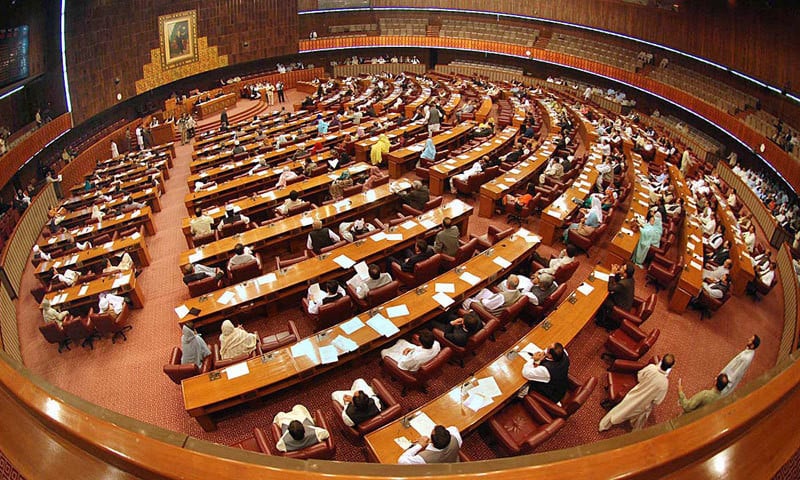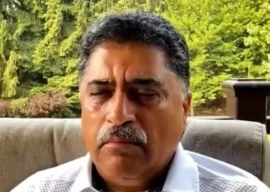
In yet another desperate attempt to deny the Pakistan Tehreek-e-Insaf (PTI) its constitutional right of having the reserved seats for women and minorities in the National Assembly, the government orchestrated on Tuesday a legal move to nullify the recent landmark judgment of the Supreme Court.
Days after the court resurrected the PTI by ruling that it was a parliamentary party and entitled to the reserved seats, a treasury lawmaker moved a bill to bar independent candidates from joining political party at a subsequent stage after the period specified for the purpose in the Constitution and the law.
Bilal Azhar Kayani of the Pakistan Muslim League-Nawaz (PML-N) tabled the Elections (Second Amendment) Act, 2024, during the National Assembly session. It was referred to the committee concerned.
Since the July 12 judgment of the apex court makes the PTI eligible for the reserved seats post-general elections, the bill stipulates that the proposed act shall be deemed to have taken effect on and from the commencement of the Elections Act, 2017.
The apex court had directed the independent lawmakers to submit affidavits of their party affiliation with the 15 days of the judgment. It would then lead to the distribution of the reserved seats among the political parties.
If all those lawmakers who have been given a chance to join the PTI, it will change the composition of the National Assembly by making the former ruling party as the single largest party and depriving the ruling coalition of two-thirds majority.
Resultantly, the government challenged the decision, and announced that the PTI would be banned and high treason proceedings would be initiated against former prime minister Imran Khan, former president Arif Alvi and former deputy speaker Qasim Suri.
Now, the ruling party's member has presented the bill, apparently, to create hindrance in the smooth implementation of the judgment as the Election Commission of Pakistan (ECP), despite raising objections to the verdict, had announced through a press release to implement it.
It all started after the ECP had distributed reserved seats among other political parties on the ground that PTI, which was sitting in the assembly under the banner of the Sunni Ittehad Council (SIC), had not submitted the list of its candidates, among other things, for the reserved seats.
Subsequently, the decision was challenged and, initially, upheld by the Peshawar High Court but, later on, set aside by the top court.
Kayani not only sought amendments to the Section 66 (Candidate to file certificate of party affiliation) and 104 (party lists for reserved seats) but insertion of new section – 104-A – and provisos in the ECP Act, 2017.
Through the amendment in Section 66, he has sought addition of the expression: "Notwithstanding anything contained in this Act or any other law for the time being in force or any judgment, decree, or order of any court including the Supreme Court and a High Court, a contesting" for the words "A contesting".
He has also sought addition of provisos: Provided that if a candidate, before seeking allotment of a prescribed symbol, has not filed a declaration before the Returning Officer about his affiliation with a particular political party by submitting party certificate from the political party confirming that he is that party's candidate, he shall be deemed to be considered as an independent candidate and not a candidate of any political party".
It adds: "Provided further that an independent candidate shall not be considered as the candidate of any political party if at later stage he filed a statement duly signed and notarized stating that he contested the general elections as a candidate of the political party specified therein."
Apparently, the provisos have carefully been drafted to specifically negate what the majority judgment of the Supreme Court stated. In section 104, a similar expression has been added, which is followed by the proviso making a political party ineligible for the quota of reserved seats at a later stage.
"Provided further that if any political party fails to submit its list for reserved seats within the aforesaid prescribed time period, it shall not be eligible for the quota in the reserved seats at later stage," the proviso reads.
Subsequently, the bill seeks insertion of a new section 104-A (consent for joining of political party by independent returned candidate to be irrevocable) in the act.
The new proposed section states: "Notwithstanding anything contained in this or any other law for the time being in force or a judgment, decree or order of any court including the Supreme Court of Pakistan and a High Court, the consent of an independent returned candidate once given for joining a political party for purposes of clause (6) of Article 51 or clause (3) of Article 106 shall be irrevocable."
In the statement of Objects and Reasons, Kayani stated that Articles 51 and 106 of the Constitution provided for allocation of seats to the national and provincial assemblies, respectively, along with mechanism for the elections thereto and include that the independent returned candidate or candidates may duly join a political party within three days of the publication in the official Gazette of the names of the returned candidates.
Kayani maintained that the Elections Act, 2017, and rules made thereunder also provided for the right to independent returned candidate or candidates to duly join a political party at his consent.
"Neither the Constitution nor the Elections Act, 2017 provide for joining a political party by an independent returned candidate or candidates at subsequent stage when they have already exercised the option to join the political party at a point of time as specified in the Constitution," he added.
To provide clarity in the law in true spirit of the Constitution, he stated, the bill had been designed to expressly provide for that no independent candidate or candidates would exercise his/their right to join a political party at a subsequent stage after the period specified for the purpose in the Constitution and the law.
After it was tabled, the law minister recommended the bill be referred to the standing committee concerned, which Speaker Ayaz Sadiq subsequently did, directing the committee chairman to convene a meeting the following day.
Additionally, the Pakistan National Excellence Institute Bill 2024 was passed during the session. Amjad Ali Khan of the SIC presented a bill to criminalise enforced disappearances, which was also referred to the standing committee concerned.
Further, the West Pakistan Maintenance of Public Order Amendment Bill was presented by Sahibzada Sibghatullah and referred to the relevant committee by the speaker. Pakistan Peoples Party's (PPP) member Agha Rafiullah introduced the Federal Employees Benevolent Fund and Group Insurance Amendment Bill 2024, which was also sent to the standing committee.
Amjad Ali Khan introduced a constitutional amendment bill to add Article 9A, which was referred to the relevant standing committee as well.
Meanwhile, the assembly debated a recent judgment of the Supreme Court pertaining to Khatam-e-Nabuwwat. Several lawmakers criticised the recent judgment in their hard-hitting speeches and urged the speaker to make a committee to examine the issue in detail and respond respectively.
The law minister, however, urged the lawmakers that the wise thing to do would be to first read the judgment first and then make any comment on it. The matter was also referred to a committee.



















COMMENTS
Comments are moderated and generally will be posted if they are on-topic and not abusive.
For more information, please see our Comments FAQ